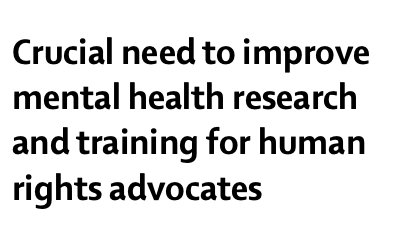Addressing trauma and emotions in human rights: Reflections from teaching and practice
Gabrielle Jackson, Sarah Paoletti, and Margaret L. Satterthwaite
As academics and practitioners operating within the sphere of human rights and immigrant rights – work that requires listening to and engaging with experiences and narratives grounded in oppression, repression, violence, insecurity, discrimination – we are challenged to intentionally and effectively address the direct and vicarious trauma that surface in our work. We are also increasingly called upon by our students to recognize and respond to the full range of emotions that human rights work entails. This chapter incorporates the expertise of a licensed clinical social worker with experience working within the immigrant rights movement and human rights advocacy spaces and the insights of two clinical law professors. Together, we address strategies for acknowledging and giving space for the emotions and trauma we and our students grapple with in clinical human rights work. In doing so, we hope to enable the next generation of advocates to consciously and actively connect with the joy and rewards that can come from the work itself, from engagement with community – a community of clients, partners, and collaborators – and from our own lives.
RELATED RESOURCES

Wellbeing Inspires Welldoing: How Changemakers’ Inner Wellbeing Influences Their Work, Severns Guntzel, J. & Murphy Johnson, N. (2020)
Read More
Mental Health Disorders and Utilization of Mental Healthcare Services in United Nations Personnel, Adam D. Brown, Katharina Schultebraucks, Meng Qian, Meng Li, Danny Horesh, Carol Siegel, Yosef Brody, Abdalla Mansour Amer, Rony Kapel Lev-Ari, Francis Mas, Charles R. Marmar and Jillann Farmer, Global Mental Health (2020)
Read More
Identifying Your Role and Practicing Self-Care as a Young Black Activist, Genisha Metcalf, DoSomething.org (October 2020)
Read More
“Racism, Whiteness, and Burnout in Antiracism Movements: How White Racial Justice Activists Elevate Burnout in Racial Justice Activists of Color in the United States”, Paul C Gorski and Noura Erakat, Ethnicities (March 2019)
Read More
Crucial need to improvemental health research and training for humanrights advocates (June 2018)
Read More


